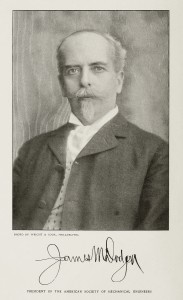Profile James Mapes Dodge circa 1903
Mechanical instinct and crea-tive facility were manifested at an early period in the life of Mr. James Mapes Dodge. The leisure of his school-boy days was largely employed in applying mechanical movements and principles to “things of use and things of play,” and his work even at this early day was characterised by originality of thought and directness of method.
Three years at Cornell University and a fourth devoted to the study of chemistry at Rutgers College, were followed by an apprenticeship at the Morgan Iron Works, in New York City, and several years of practical work in the shipyards of John Roach, at Chester, Pennsylvania. During this period several iron steamships were built at these yards for the Pacific Mail Steamship Company. Among them was the City of San Francisco, whose engines and machinery were built under his super-vision. Though but twenty-three years of age at that time, Mr. Dodge was also in charge and responsible for the installation of the machinery in the ship and its operation on the successful trial trip which followed.
In 1879 he removed to Chicago, and, as superintendent, took charge of the factory of the Ewart Manufacturing Company, forming a connection with the infant link-belt industry which has never been broken, and in which at present he represents a large interest as president of the Link-Belt Engineering and Dodge Coal Storage Companies.
As an inventor Mr. Dodge is singularly resourceful and direct, reaching his results by the short cut rather than the travelled road, and it has been noted that his original models and designs have rarely been improved by alteration. Of the more than one hundred patents which he has taken out, an unusual percentage has proved commercially valuable, representing prompt and original solutions of present problems and clear foresight of his chosen field.
In executive work Mr. Dodge has had long and eminently successful experience. Sound in judgment and convincing in statement, yet considerate of dissenting opinions, he has ever regarded leadership as the privilege of leading and co-operation as more valuable than obedience. Quick sympathy, a magnetic personality and most genial temper are qualities by which his friends best know him. To grant a request rather than refuse it, to remove obstacles rather than create them, to suggest alternatives instead of condemning an unwise proposition, are all characteristic of Mr. Dodge’s distinctly affirmative mind.
The American Society of Mechanical Engineers is to be congratulated on securing Mr. Dodge as its presiding officer. Experienced in executive work, active in the affairs of the society, distinguished as an inventor, broadly conversant with progress in mechanical lines, of wide professional and social acquaintance, successful in his own business, and in the prime of life, he cannot fail in his term of office to justify the choice of the Society for its highest official honour. Mr. Dodge was born in 1852 and is the son of the distinguished authoress, Mary Mapes Dodge.

